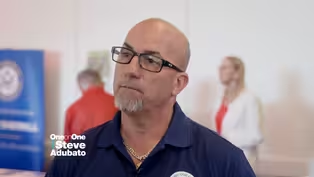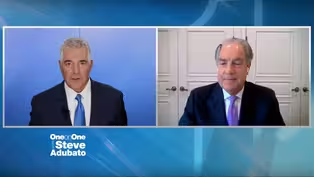One-on-One
Artificial Intelligence in higher ed and keys to leadership
Clip: Season 2025 Episode 2845 | 8m 52sVideo has Closed Captions
Artificial Intelligence in higher ed and keys to leadership
Steve Adubato talks with Dr. Nicole Koppel, MBA Director and Professor at Montclair State University’s Feliciano School of Business, about Artificial Intelligence in higher ed, how online programs have helped working professionals, and the keys to leadership and lifelong learning.
Problems playing video? | Closed Captioning Feedback
Problems playing video? | Closed Captioning Feedback
One-on-One is a local public television program presented by NJ PBS
One-on-One
Artificial Intelligence in higher ed and keys to leadership
Clip: Season 2025 Episode 2845 | 8m 52sVideo has Closed Captions
Steve Adubato talks with Dr. Nicole Koppel, MBA Director and Professor at Montclair State University’s Feliciano School of Business, about Artificial Intelligence in higher ed, how online programs have helped working professionals, and the keys to leadership and lifelong learning.
Problems playing video? | Closed Captioning Feedback
How to Watch One-on-One
One-on-One is available to stream on pbs.org and the free PBS App, available on iPhone, Apple TV, Android TV, Android smartphones, Amazon Fire TV, Amazon Fire Tablet, Roku, Samsung Smart TV, and Vizio.
Providing Support for PBS.org
Learn Moreabout PBS online sponsorship(upbeat music) - From beautiful Montclair State University, we have a scholar in the field of business and leadership and management.
Dr. Nicole Koppel.
She's MBA Director and professor at the Feliciano School of Business at the Montclair State University, my alma mater.
Good to see you, doctor.
- Nice to see you too.
Thank you for having me.
- Hey, Nicole.
We are up at campus with your president, and some other terrific leaders up at Montclair State recently for an in-depth interview that we did with Bob Garrett, the CEO of HMH, Hackensack Meridian Health.
And I was curious about this, which is why I wanna, one of the reasons I wanted to have you come on.
How did you get into academia, A?
And B, why this field of business in academia?
- So, I mean, again, my father was a professor, so I sort of had it in the, runs in the family business.
But I like teaching.
I think it's a great way to really get involved and it's a fun industry.
I think academia is a great field to be in.
It's a great profession.
It's a great balance for, as a mom, as a profession, I like teaching.
And I've been at Montclair, this is actually, I'm just finishing up my 25th year.
- Wow.
- However, I've been the MBA Director for about 16 years now.
And so I never really got into it to be in administration side of things, but I feel like the way things worked out for me, it's a great balance, being able to teach, which is what I love to do, but also kind of running a business, running a program, and really having an opportunity to be creative, but most importantly, making a difference in students' lives.
And we did start an online MBA back in 2016, and so we're almost going on 10 years of our online MBA, which has been really our largest program.
And that's been continually growing and has a mass appeal.
We're really able to deliver an advanced degree, a graduate degree to students to be successful in a fully asynchronous online capacity, and really teaching students what they need to be successful in life, and eventually, a great leader.
- Nicole, stay on that.
As someone who's taught, on your end, on both sides, it's, I'm not gonna say it's easier to teach, to facilitate remotely.
Do you think there's a significant difference between the impact of teaching in person versus remote?
And I know it depends upon the class, the professor, the students, the all of it.
Go ahead.
- Yes.
Yes to everything you just said.
I would say maybe today, less so than I would've said eight or nine years ago.
I recently was having a conversation about textbooks, and they're almost a passe thing, the way students learn now.
Whether they're using eBooks and readers and I guess, yes, of course, AI.
But in everything we're learning, students need to learn technology and learn how to be good, informed, ethical users of technology to be successful in industry.
We've gotten smarter in the way we're able to use the technology in our teaching.
I think our students are becoming more savvy in using the technology and are much more comfortable in this environment.
And I think we've had a lot, there's a lot of tools and products out there that help create and simulate what the real world is.
The truth is, we're training them to work in business.
And years ago we were training them to work in business, so we were training them online, and then they were doing their work fully in person.
It was a mismatch.
But today they are working in remote teams, they're working in global teams, and that's part of the way they're learning and they're able to learn how to work remotely.
So yes, there's definitely a difference.
I mean, again, in that sense, I'm a little bit old school, face-to-face, in person, really does make a difference.
But I think we do a pretty good job of coming close to delivering the same level of success in an online environment.
- Nicole, to your point, I'm not about the business of plugging my last book, but there's a chapter in "Lessons in Leadership 2.0: The Tough Stuff," in which we tell people, I'd rather be in person.
Yeah, I know you'd rather be in person, but this is the hand you've been dealt.
You have to be able to engage and communicate and connect with others remotely.
Even five plus years after COVID, a significant percentage of the people we work with and coach and teach, they're not connecting.
They're looking in the wrong place.
They don't, I don't wanna put my camera on today.
What?
- Really the difference of not in person and the benefits and growth of the benefits and in some cases decline, or negative aspects of teaching remotely.
Students are often distracted, they're multitasking.
Some of them, they could go to class while they're driving in their car and doing other things.
And again, whether they wanna put on their cameras or not.
However, the bright side of it, I think there's a lot of benefits to it as well.
And I think most important is you still need to stay engaged.
You need to concentrate.
- That's right.
- You cannot be multitasking.
You gotta be present.
And I think one of the things that we really pride ourselves on, our work on, is really giving students student engagement, experiential opportunities to really practice doing what they do best.
And in many cases, it is over technology.
And yes, we do have to remind students to put on their camera.
Yes, get themselves centered in their camera, show that they're present, sit up straight, don't be lying in their bed, whatever those kind of things are, absolutely.
But I do think we show them why it's important.
- That's right.
- And bring in role for them to see that.
So I think they're gonna have to learn that this is the way that the world is turning, and they're gonna have to be able to work in all these different environments.
- I think you know, as I talked about this with Bob Garrett on campus, and I talked with you about, I'm obsessed with, as a student of leadership, the connection between being a solid, effective, impactful communicator and being a great leader.
It is impossible to be a great leader if you're not an effective communicator.
Is that a fair assessment?
- 100%.
We see it time and again.
Again, we can have great academics, but unless you really are able to communicate, and a bigger part of the soft skills.
But really, and we, Bob Garrett was here, part of actually our executive speaker series.
And so we've had a number of different high level executives coming in and one after the next, and again, doing this for a number of years.
It is their communication, it's their demeanor, their personality.
Really a people person makes such a difference in being a successful leader, and having people listen to you, wanna follow you, or inspired by you are great mentors for our students, and really an inspiration.
So, 100%, I agree with you.
You gotta be a great communicator to be a great leader.
- You got it right.
That is, Dr. Nicole Koppel, MBA Director and professor at the Feliciano School of Business at Montclair State University.
Nicole, great having you with us, an important conversation.
We look forward to talking in the future.
- Thank you so much.
Really enjoyed it.
- It was a pleasure.
Well said.
See you next time.
- [Narrator] One-On-One with Steve Adubato is a production of the Caucus Educational Corporation.
Funding has been provided by Horizon Blue Cross Blue Shield of New Jersey.
PSE&G.
New Jersey Sharing Network.
The Turrell Fund, a foundation serving children.
The North Ward Center.
Johnson & Johnson.
NJ Best, New Jersey’s five-two-nine college savings plan.
NJM Insurance Group.
And by The Port Authority of New York and New Jersey.
Promotional support provided by CIANJ, and Commerce Magazine.
And by ROI-NJ.
- How long you been waiting?
- About a half hour.
- Brutal.
This keeps up, I'm gonna miss my pickleball game.
- I've been waiting eight years for a kidney.
What can you do?
(gentle music) - [Narrator] Over 100,000 people in the US are waiting for a life-saving transplant.
But you can do your part in an instant.
Register as an organ donor today at NJSN.org.
How this non-profit is combatting food insecurity
Video has Closed Captions
Clip: S2025 Ep2845 | 6m 25s | How this non-profit is combatting food insecurity (6m 25s)
The keys to dyad leadership and launching Liberty Bank of NJ
Video has Closed Captions
Clip: S2025 Ep2845 | 10m 47s | The keys to dyad leadership and launching Liberty Bank of NJ (10m 47s)
Providing Support for PBS.org
Learn Moreabout PBS online sponsorship
- News and Public Affairs

Top journalists deliver compelling original analysis of the hour's headlines.

- News and Public Affairs

FRONTLINE is investigative journalism that questions, explains and changes our world.












Support for PBS provided by:
One-on-One is a local public television program presented by NJ PBS

